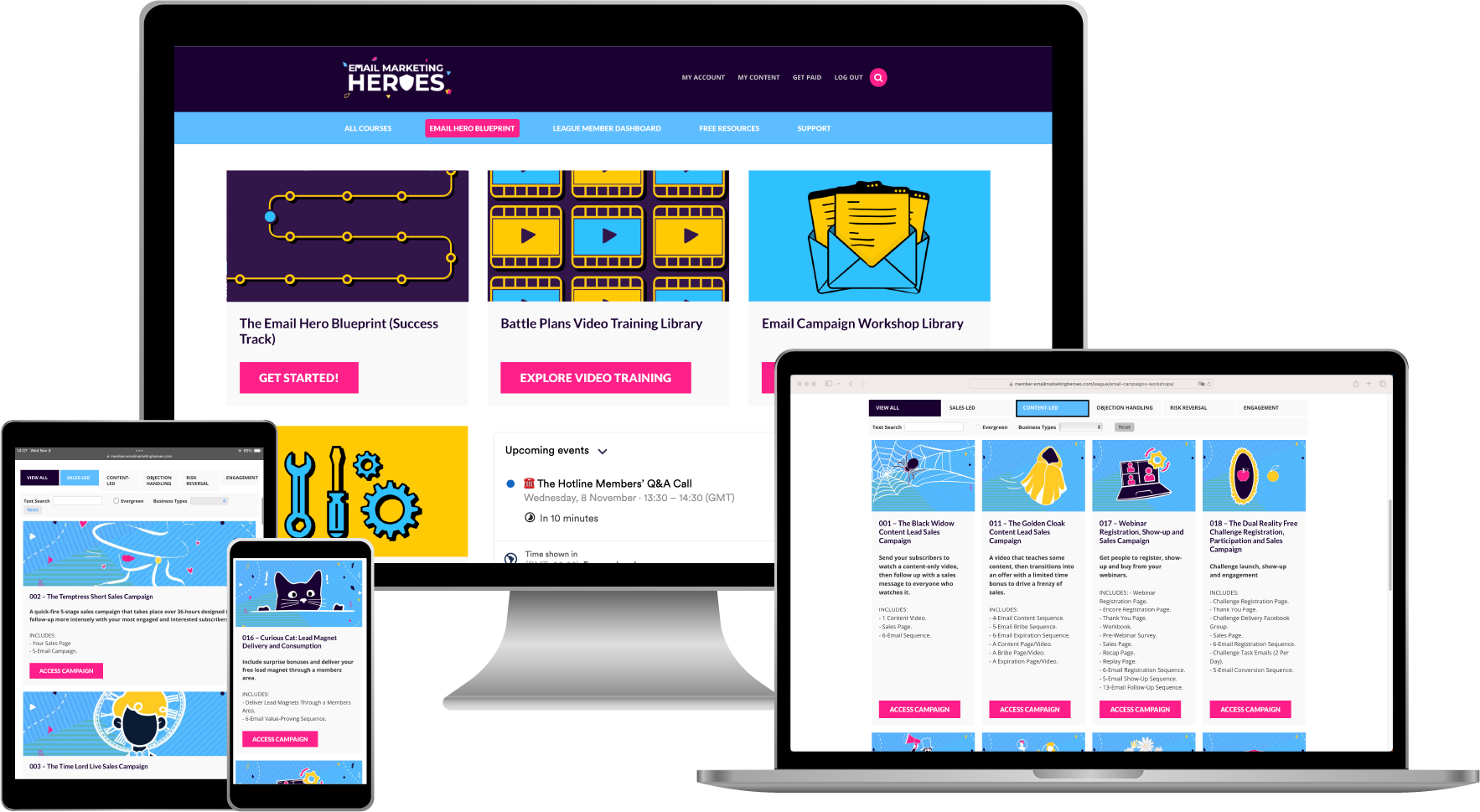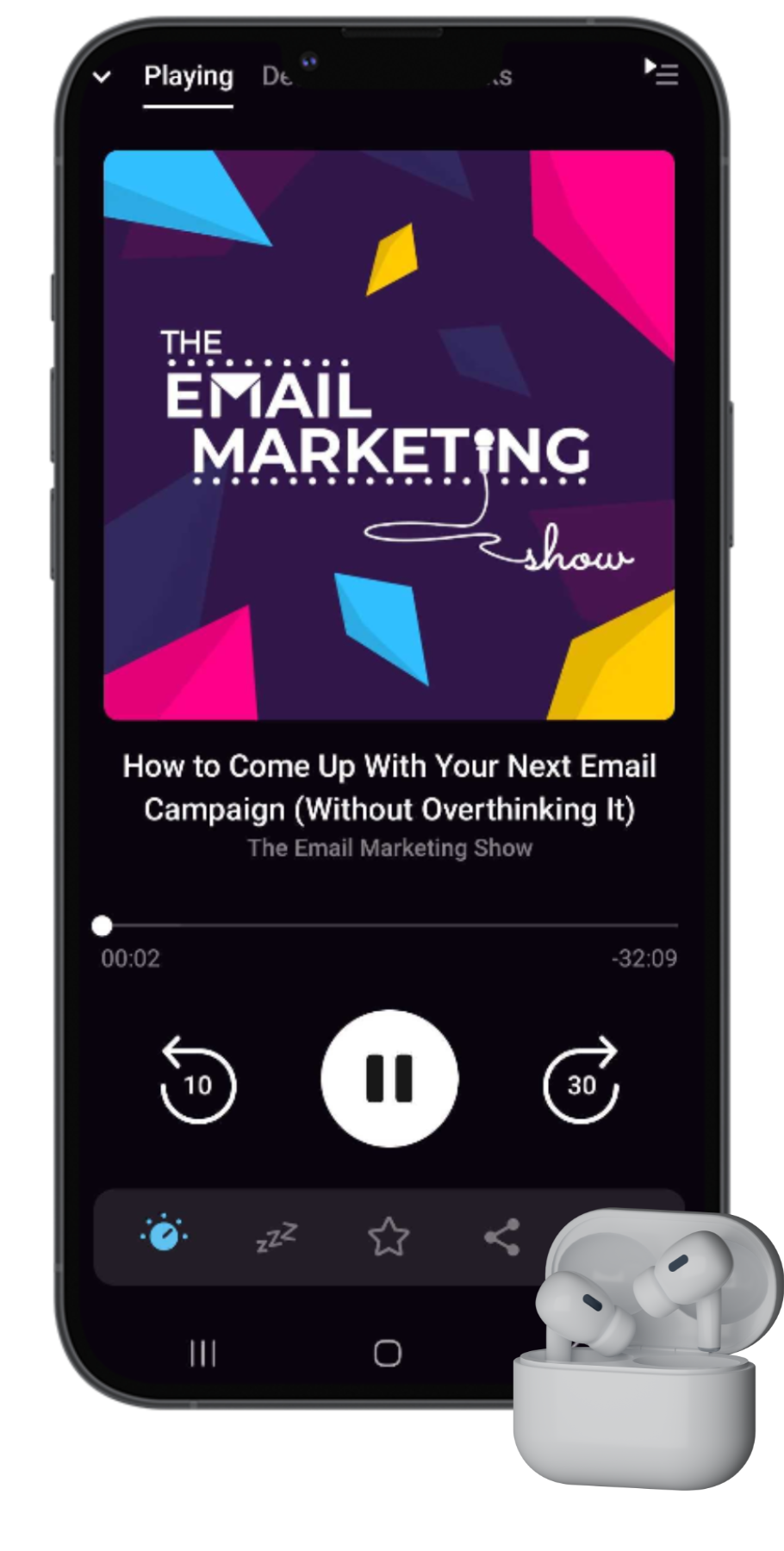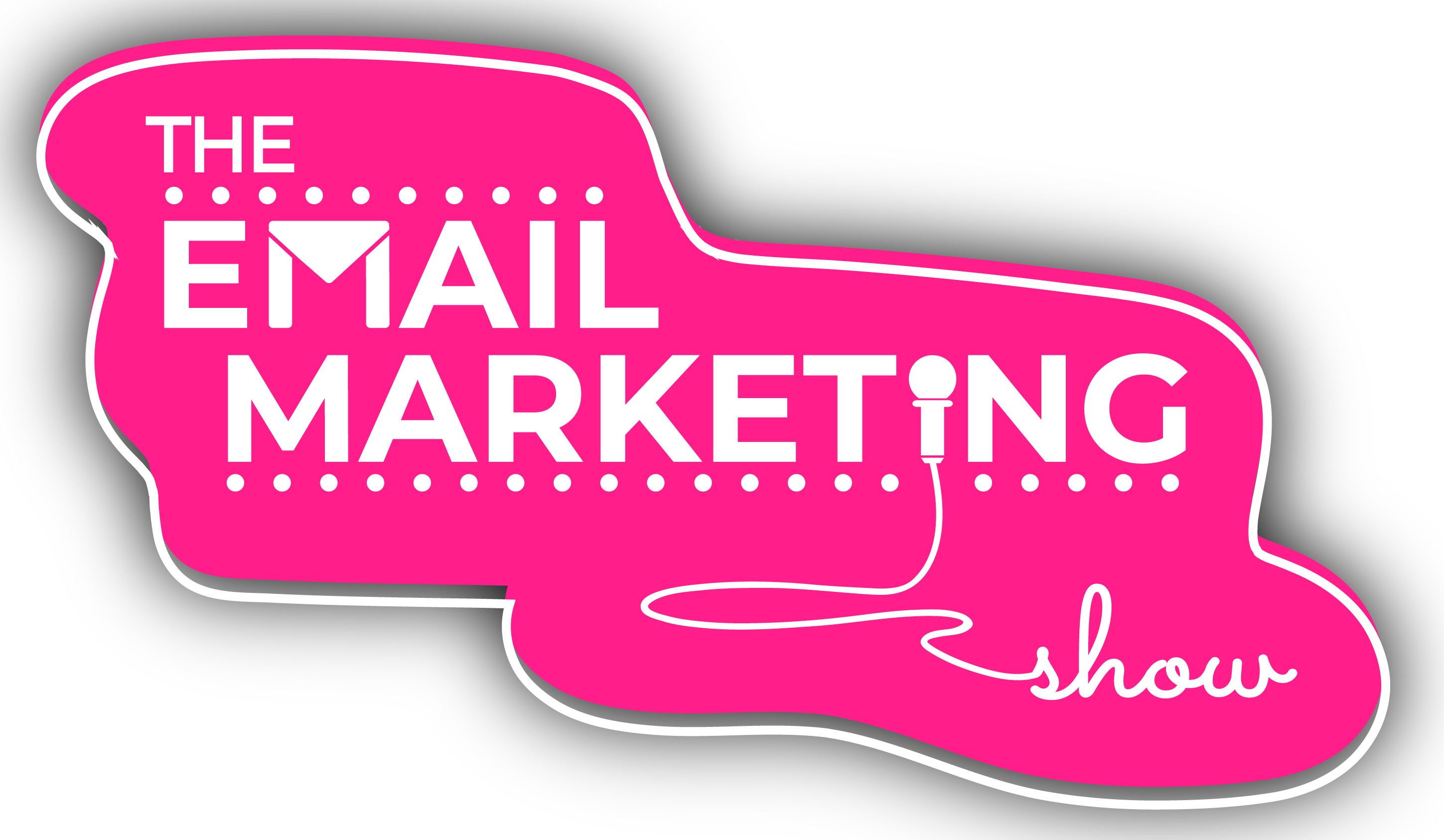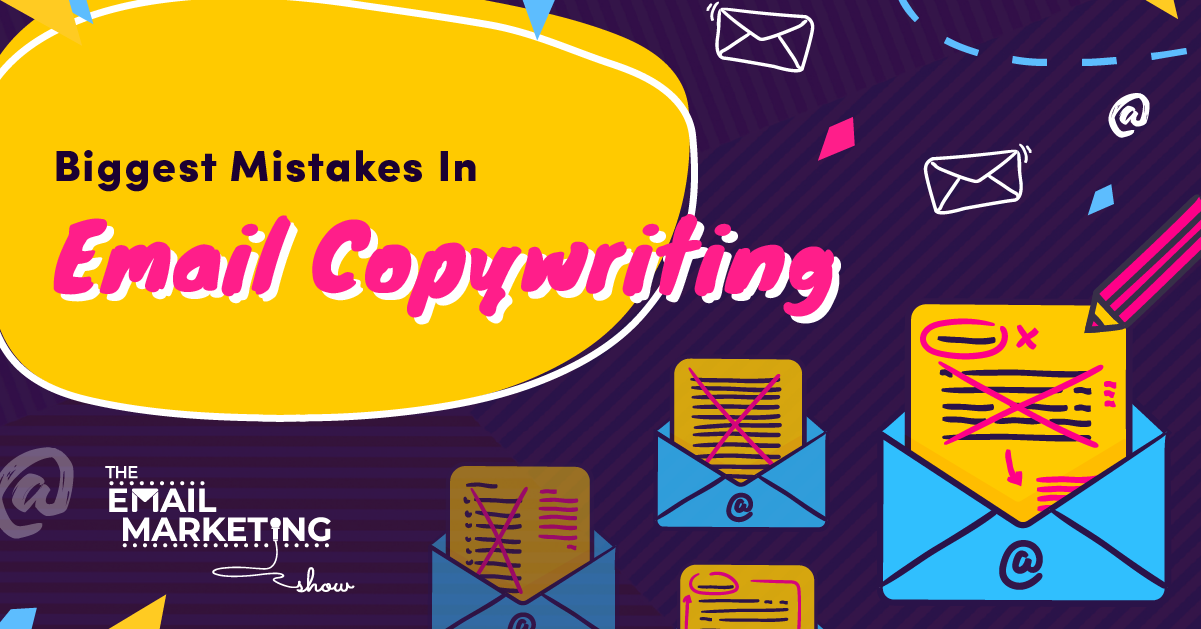
The Biggest Mistakes You’re Making With Your Email Marketing Copywriting
Are you making any of these email marketing copywriting mistakes? Curious to know what we're talking about? If you're keen to improve your email copy, we've got some super-easy tips here for you. Check them out!
SOME EPISODE HIGHLIGHTS: (0:09) Want a FREE resource to get more clicks on your emails? Check out Click Tricks. (4:30) Check out our sponsor Poster My Wall. (5:09) Is successful email marketing all about copywriting? (12:06) Boring subject lines. (13:01) The wall of text. (14:58) Beating around the bush. (16:10) Sounding like you're writing your English coursework. (17:31) Not using stories or making them too long. (19:59) Assuming your audience knows your industry the way you do. (22:20) Doing 'back referencing' the wrong way. (26:10) Subject line of the week.
Is successful email marketing all about copywriting?
First thing first, let's get this out of the way…
Do you need to be a great writer/copywriter to be successful at email marketing? In our opinion, no. Because no one likes to receive emails from the slick copywriter (unless that’s what you do). Rather than having perfectly written and polished copy, you want to connect with your audience!
And when you think about it, this is true of sales copy too. Because the minute you say something that doesn't resonate with your readers, you lose them – they'll close the page and be gone forever. With email though, if the person's on your list, you get more attempts than just one to grab and hold their attention.
You don't have to write one big thing with a beginning, a middle, and an end – it’s not a long journey! Email marketing is done in short bursts, so it doesn’t matter if you get lost along the way because you'll get another crack at it tomorrow.
But there's another reason why email marketing isn't all about the copy. And it's this…
The 3 elements of successful email marketing
There are 3 key elements to email marketing:
- The words/copy.
- The structure.
- And the strategy.
The copy is what you say in your emails to make people engage with you and feel things. And that only accounts for 20% of the impact an email can have. This is true for any form of communication because it's all to do with the para language, i.e. what runs parallel to the language. In other words, it's about how you say something or the context in which you say it.
Structure is way more important than copy, and it's about how many emails you send, when you send them, how long you wait in between emails, who you send them to, etc. And strategy is about the hooks and the angles in your emails.
Remember, we're talking about strategy here – not tactics. Tactics are things you do, i.e. individual points of action. A strategy strings together lots of tactics in a specific way – it's where the tactics compound one another. If you have a bunch of tactics that are not compounding the results of each other, then you don't have a strategy.
So if you’re worrying about the words, don’t. Because you can have the best words in the world, but if the structure and the strategy aren’t there, your email marketing isn’t going to work. Instead, you could use the simplest, dumbest words you want, but if you’re talking about something that’s concise and resonates with people, those emails are going to win every time over perfect words that end up disengaging your audience. In other words, you're better off sending out a well-structured campaign made of 12-20 fairly average emails compared with one flawlessly-written email based on good-practice copywriting.
Common mistakes in email marketing copywriting
Having said that words only account for 20% of your email marketing, you want to get that right! So here are some common mistakes we see people make in their email marketing copy (and how to fix them).
The snooze-fest and writing boring subject lines
If you’re writing subject lines based on formulas (i.e. which look and sound formulaic), then stop! Because everyone’s seen them and is using them. We have specific training to help you write subject lines that make sales, and we can teach you how to come up with original, innovative, provocative, and attention-grabbing subject lines.
The best tip we can give you is to look at your emails (once you've written them) and then tease out your own unique subject lines that display your personality and use compound curiosity.
The wall of text (More white space, please!)
White space on emails is a great thing. Think about it – when you're sending ‘real' emails (i.e. transactional emails back and forth with someone), you don’t do a lot of interesting stuff with the format. Generally, you just take it from left to right and all the way across. You write and hit send.
With email marketing though, while you want to try and create the feel, the personality, and the personal nature of a real transactional email, you want to keep short sentences. The emails Rob sends out, for example, are often made of one-sentence paragraphs (or, rarely two). Because a big wall of text is always hard to read, especially on a mobile phone.
So use one/two sentence paragraphs and include lots of white space. You can even write a short sentence on one line, add a few dots, and pick up (starting with the dots) on the next line. It makes it a lot easier to chew, and it means people can consume your emails one little bit at a time.
Beating around the bush
Are you going on and on and on in your emails? Then just get straight to the point because you want to make one point per email! And if you don't have a clear strategy of what that is, your emails will go round in circles.
The benefit of making one point per email is that it gives you a great excuse to send more emails – because you have more things to say, right? So if today’s email is about social proof, then you’re not allowed to talk about the discount! Make today's email about social proof and nothing else. This helps you create clarity and allows the reader to lock into that one thought, which can now grow in their heads.
Sounding like you’re writing your English coursework
Email marketing is not the same thing as writing essays – you don't need your emails to sound clever or intelligent. Instead, you want them to sound simple and accessible, regardless of who your audience is. Your emails need to read as something that anyone can access, understand, and get value from. You’re not trying to impress anyone or score points.
The only purpose of your emails is to drive sales, and a lot of the time, when people think they can't do email marketing because they're not good writers, it's because they think the writing has to be impressive, intellectual, and intelligent.
And that’s not true. You just have to sound like you. So if you have an amazing use of the language and that’s you, then great. But if you talk very casually in real life, that’s what you want to translate in your emails.
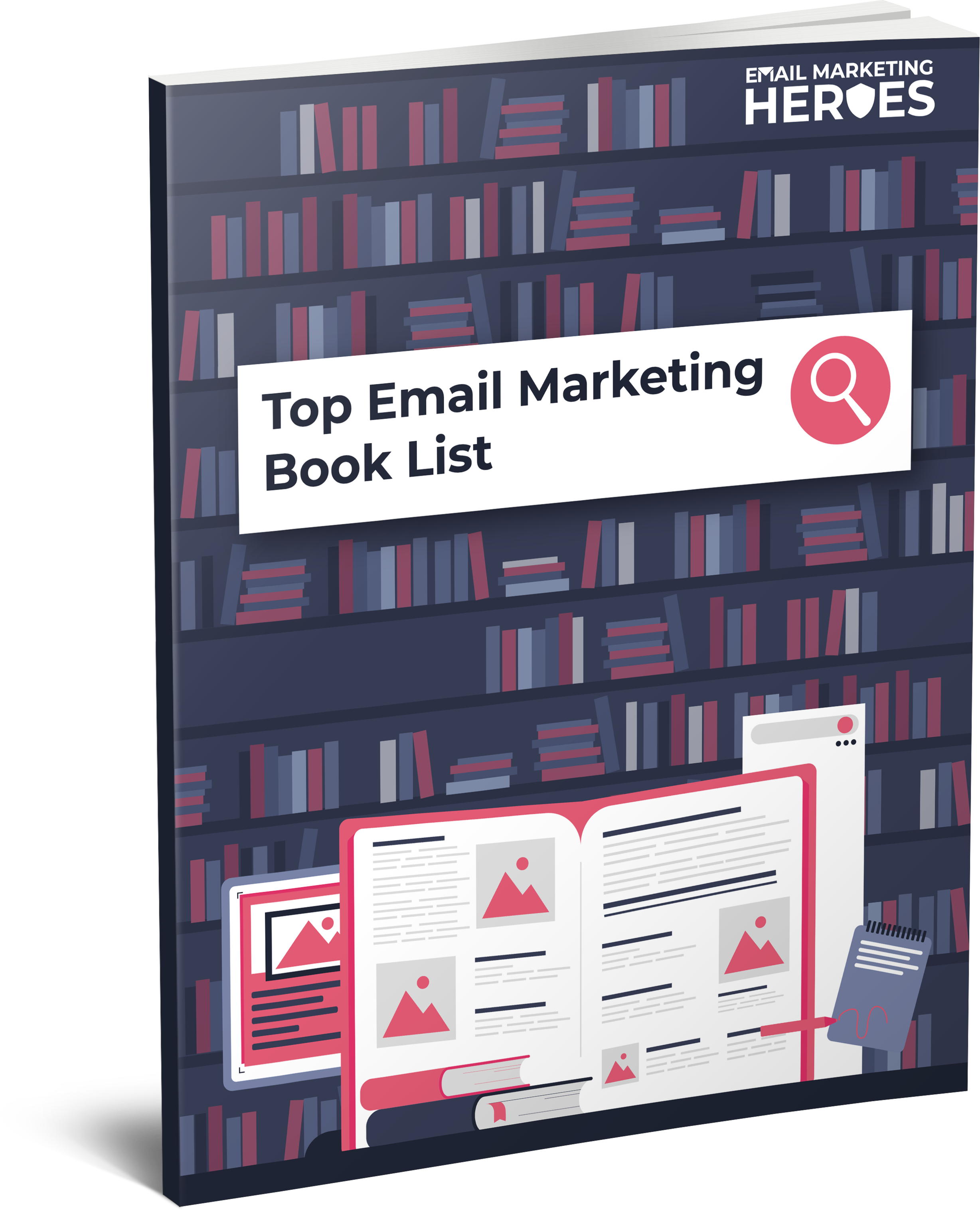
The Top 10 Books To 'Power Up' Your Email Marketing
10 book recommendations that will improve all areas of your email marketing (including some underground treasures that we stumbled upon which have been game-changing for us).
Not using stories or making them too long
Are you just telling facts in your emails? Then please don't. Because you're going to connect a lot more deeply with your audience if you use some storytelling. Of course, not every email needs to be a story. But weave in some stories. The good news is that this is easy enough to do because you can turn anything into a story!
When you use stories though, make sure they're not too long. Don't include details that aren't important – cut them out. The quickest way to do that is by starting in the action – with the big moment. You can chop off a lot of the context, which you can then build in by implication.
For example, if you say “I remember the day I got married,” you don’t necessarily need to specify that it was in a church (unless the church is relevant to the story). Instead, let people fill in the gaps. Let them imagine and picture where the wedding might have happened because a lot of the story can be implied.
Assuming your audience knows your industry like you do
Don't assume your audience knows what you do and don't use jargon. For example, if we send out an email saying we're going to teach people how to improve their EPSPM, a lot of people won’t know what we’re talking about! So we'd have to break it down and explain that EPSPM refers to the Earnings per Subscriber per Month, and it's how much you earn for every subscriber you have on your list.
Why is this important? Because when someone reads anything they don’t understand, it’s like they’re trying to read with their eyes half closed! Make it easy for people – don’t assume they know anything about your industry and don’t get technical. At the same time, don’t get condescending, and ensure that what you're talking about is super clear.
Doing ‘back referencing' the wrong way
‘Back referencing' is about referring to an email you’ve previously sent that people may have not seen. Nobody gets 100% open rates, so if you send an email today and refer back to something you sent in the past, and the person hasn't seen it, you'll lose their interest. Because when someone doesn't understand the context, they don't feel part of the ‘in crowd' – they don't know what's going on. And as an email marketer, you definitely don’t want people on your list to feel like that.
The only time we use back referencing in our emails is when we know for sure that someone’s read that email because they’ve engaged with the content. For example, we have campaigns where we ask people to watch a video, and because we track all of that, we know when they've seen it and how much of it they've watched. So in those cases, we can confidently refer back to the video in further emails down the line.
Or, let's say you're sending out a series of emails about signing up for a webinar. If you know someone hasn't registered, you can say you've noticed they haven't registered yet and they've perhaps missed the emails you sent out over the last week or so. This is a good way to leverage the ‘back referencing' technique. The previous emails you've sent (in this case about registration) give you an excuse to send today's email.
Don't worry too much about spelling and grammar!
So when it comes to writing emails, don’t worry too much about your spelling and grammar. Sure, try to get it right. But if you don’t, it’s fine! You probably know that Kennedy is dyslexic, and he tells people from the start that if they sign up for his list, they'll probably find typos. And if they're offended by those, it’s probably best they don’t register.
Just remember that the structure and the strategy are more important than the copywriting – the way the emails link together is more impactful for your engagement and sales. But if you want to make your copy better, do pay attention to these mistakes.
Subject line of the week
This week’s subject line is “Something magical.” It talks about the fact that we used to go to magic conventions a lot. And as you can see, this subject line has nothing to do with selling the benefits of a particular product. In fact, the goal of this subject line isn't to be clever or enticing. It's more about differentiating today's email from tomorrow's.
If someone's on our list, they like receiving our emails. They know our general approach and the structure and strategy of our email marketing. And that means that sending out subject lines like these is still appealing to them. So check it out!
Useful Episode Resources
Related episodes
Advanced Psychology: Using Compound Curiosity.
Mindblowing Techniques To Connect More Deeply With Your Email Readers With Rob Marsh & Kira Hug.
Why You Need to Avoid These Email Marketing Mistakes.
FREE list to improve your email marketing
If you want to write better emails, come up with better content, and move your readers to click and buy, here's how. We put together this list of our Top 10 most highly recommended books that will improve all areas of your email marketing (including some underground treasures that we happened upon, which have been game-changing for us). Grab your FREE list here.
Join our FREE Facebook group
If you want to chat about how you can maximise the value of your email list and make more money from every subscriber, we can help! We know your business is different, so come and hang out in our FREE Facebook group, the Email Marketing Show Community for Course Creators and Coaches. We share a lot of training and resources, and you can talk about what you're up to.
Try ResponseSuite for $1
This week's episode is sponsored by ResponseSuite.com, the survey quiz and application form tool that we created specifically for small businesses like you to integrate with your marketing systems to segment your subscribers and make more sales. Try it out for 14 days for just $1.
Join The League Membership
Not sick of us yet? Every day we hang out in our amazing community of Email Marketing Heroes. We share all of our training and campaigns and a whole bunch of other stuff. If you're looking to learn how to use psychology-driven marketing to level up your email campaigns, come and check out The League Membership. It's the number one place to hang out and grow your email marketing. Best news yet? You can apply everything we talk about in this show.
Subscribe and review The Email Marketing Show podcast
Thanks so much for tuning into the podcast! If you enjoyed this episode (all about the biggest mistakes you’re making with your email marketing copywriting) and love the show, we'd really appreciate you subscribing and leaving us a review of the show on your favourite podcast player.
Not only does it let us know you're out there listening, but your feedback helps us to keep creating the most useful episodes so more awesome people like you can discover the podcast.
And please do tell us! If you don't spend time on email marketing, what do you really fill your working days with? We'd love to know!

